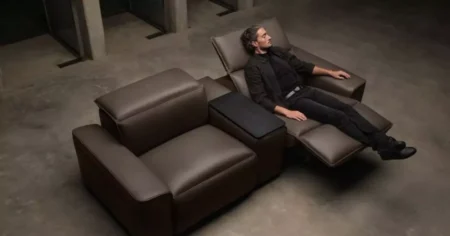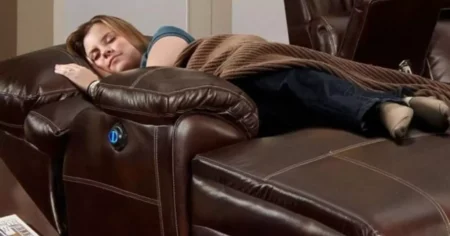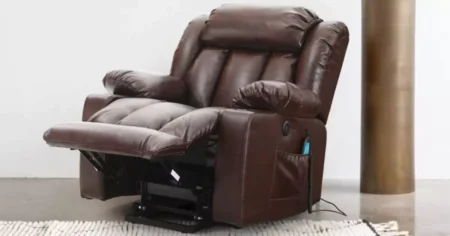As someone who has experienced neck pain, you know how debilitating it can be. Even the simplest tasks become difficult, and the pain can be unbearable at times.
If you’re a fan of recliners, you may be wondering whether they’re bad for your neck.
The short answer is that it depends on the recliner and how you use it.
Here in this article, I’ll go through all the necessary information you need to know. So without further ado, let’s get started:
The Harms of Recliners on Your Neck
When you sit in a recliner, your head and neck are often tilted back, which can cause strain on the muscles and joints in your neck.
If you spend a lot of time in a recliner, this strain can build up over time and lead to chronic pain and discomfort.
One of the main reasons recliners can be harmful to your neck is that they encourage poor posture.
When you sit in a recliner, it’s easy to slouch or lean your head too far back, which can put unnecessary strain on your neck.
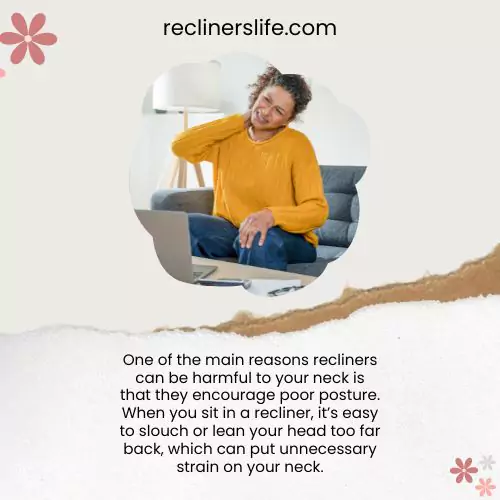
Additionally, many recliners are designed with a headrest that doesn’t provide adequate support for your neck.
The Science of Recliner-Related Neck Pain
To understand why recliners can be harmful to your neck, it’s important to understand the science behind neck pain.
Your neck is made up of seven vertebrae, along with muscles, ligaments, and nerves.
When these components are out of alignment or under too much strain, it can lead to pain and discomfort.
When you sit in a recliner with poor posture, it can cause the muscles and ligaments in your neck to become strained.
Additionally, the weight of your head can put pressure on the nerves in your neck, leading to a pins-and-needles sensation or numbness.
Over time, these issues can become chronic and lead to more serious problems.
Are Recliners Bad For Your Neck? Here is How to Know?
If you’re experiencing neck pain and you’re unsure whether your recliner is to blame, there are a few signs to look out for.
- The first is whether your recliner has a headrest that supports your neck adequately.
- If not, you may find yourself straining to keep your head in a comfortable position, which can lead to neck pain.
- Another sign that your recliner may be causing neck pain is if you feel discomfort after sitting in it for an extended period of time.
- If you notice that your neck feels stiff or sore after spending time in your recliner, it may be time to make some adjustments to your posture or invest in a new recliner.
Tips for Adjusting Your Recliner for Neck Support
If you’re a fan of recliner sofas but want to avoid neck pain, there are a few adjustments you can make to ensure that your recliner provides adequate support for your neck.
The first is to adjust the angle of your recliner so that your head and neck are in a comfortable position.
Ideally, your head should be in a neutral position, not tilted too far back or forward.
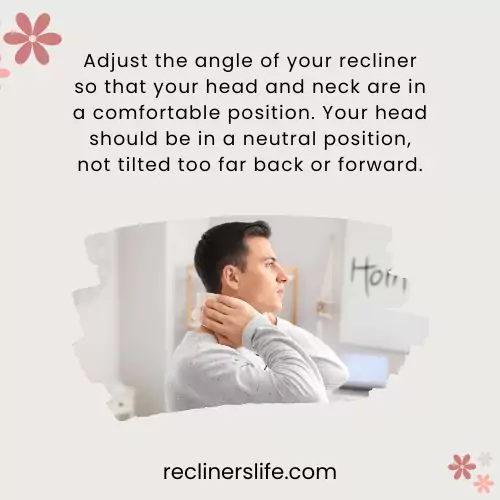
Another adjustment you can make is to invest in a neck pillow or cushion.
These products can provide additional support for your neck and help you maintain proper posture while sitting in your recliner.
Furthermore, you can try using a rolled-up towel or small pillow to support your neck while sitting in your recliner.
Choosing the Right Recliner for Your Neck Health
If you’re in the market for a new recliner, there are a few things to keep in mind to ensure that you choose a recliner that supports your neck health.
The first is to look for a recliner with a headrest that is adjustable and provides adequate support for your neck.
Secondly, you’ll want to look for a recliner with a backrest that is high enough to support your entire back, including your neck.
The recliner should also have adjustable settings so that you can find the perfect position for your body.
Finally, look for a recliner chair made with high-quality materials that will provide long-lasting support and comfort.
How to Alleviate Recliner-Related Neck Pain?
If you’re experiencing neck pain from spending time in your recliner chair, there are a few simple stretches you can do to alleviate your discomfort.
The first stretch is to tilt your head forward and hold the stretch for 15-30 seconds.
Then, tilt your head to the side and hold the stretch on each side for 15-30 seconds.

Another effective stretch is to roll your shoulders back and down.
Then gently tilt your head back and hold the stretch for 15-30 seconds.
At last, you can try turning your head to the left and right, holding the stretch on each side for 15-30 seconds.
Lifestyle Changes to Improve Your Neck Health
If you’re experiencing neck pain from spending some time on your recliner sofa, there are a few lifestyle changes you can make to improve your neck health.
- Take Frequent Breaks
Avoid sitting in your recliner for long periods. Stand up and move around every 30 minutes to give your neck a break from sitting.
- Practice Good Posture
Sit up straight with your shoulders back and down. Keep your head in a neutral position to improve posture and reduce neck strain.
- Incorporate Regular Exercise
Exercise regularly to improve overall health and reduce the risk of neck pain. Strengthen neck and back muscles and include cardiovascular workouts for better spinal health.
When to Seek Medical Attention for Recliner-Related Neck Pain
While most cases of recliner-related neck pain can be alleviated with simple lifestyle changes and stretches.
There are some cases where medical attention may be necessary.
If you experience severe or chronic neck pain, or if your neck pain is accompanied by other symptoms such as numbness, tingling, or weakness, it’s important to seek medical attention.
Your healthcare provider can help you determine the underlying cause of your neck pain and recommend treatment options to reduce your discomfort.
This may include physical therapy, medication, or in some cases, surgery.
Also Read:
Conclusion
At the end of the day, recliner chairs can be a comfortable and relaxing way to unwind after a long day, but they can also contribute to neck pain if not used properly.
By taking the time to adjust your recliner for proper neck support and incorporating simple stretches and lifestyle changes into your routine, you can alleviate neck pain and improve your overall neck health.
Remember to look for recliners with adjustable headrests and high-quality materials to ensure that you’re getting the best support possible.
Additionally, try to break up your sitting time and practice good posture habits throughout the day.
By taking care of your neck health and making adjustments to your recliner use, you can enjoy the benefits of a comfortable and supportive seating option without the discomfort of neck pain.
Frequently Asked Questions
Are recliners bad for your posture?
Sitting in a recliner for prolonged periods can lead to poor posture and strain on the back and neck muscles.
However, recliners with adjustable headrests and lumbar support can promote good posture and spinal alignment.
Is sleeping in a recliner bad for your neck?
Sleeping in a recliner can cause neck pain and stiffness, especially if the headrest is not adjustable or if the recliner is not properly positioned.
It is recommended to use a supportive pillow and adjust the recliner to avoid straining the neck muscles.
Do chiropractors recommend recliners?
Chiropractors may recommend recliners with adjustable headrests and lumbar support to promote good posture and spinal alignment.
Are recliners good for your spine?
Recliners with adjustable headrests and great support can promote good spinal alignment and reduce strain on the back muscles. However, recliners that do not provide proper support can contribute to poor posture and spinal misalignment.
Is reclining better than sitting straight?
Reclining can provide relief for back pain and reduce pressure on the spine compared to sitting straight.
What is the best position to sleep in a recliner?
The best position to sleep in a recliner is with the headrest adjusted to support the neck and head, and the recliner positioned to promote good spinal alignment.
Additionally, using a supportive pillow can help alleviate neck and back pain.


